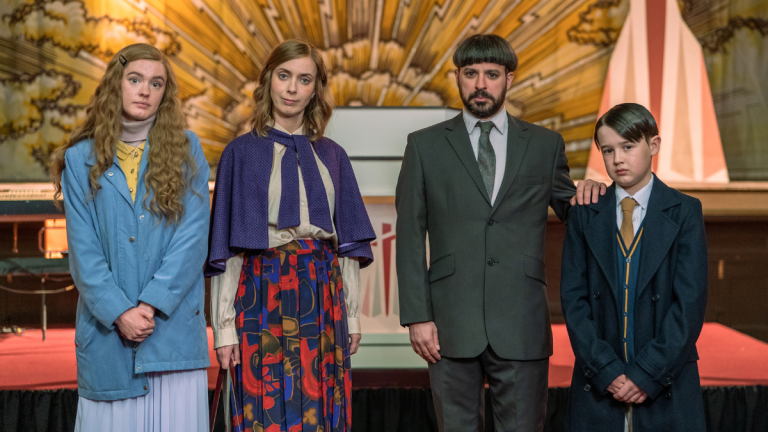Everyone Else Burns: How Do You Make Religious Cults Funny?
Channel 4’s new sitcom, starring Simon Bird and Lolly Adefope, is a slow-burner that struggles to balance humour with its dark subject matter

Warning: this article contains plot details for Everyone Else Burns
‘We’ll meet the congregation, we’ll pray, shelter, and eventually bury the corpses of the sinful dead. It’s going to be very special.’
These are the words mum Fiona uses to describe the plan to her terrified daughter in the opening scenes of Everyone Else Burns, as dad David takes them on what the children don’t yet realise is a middle-of-the-night apocalypse training exercise rather than the real thing.
As sitcom openings go, it throws us straight into the action, and while the scene is disappointingly lacking in decent jokes, Channel 4’s latest comedy confidently establishes the Lewis family’s life in a super-strict apocalyptic religious cult.
Such speedy exposition involves some heavy-handedness as we meet pompous patriarch David (Simon Bird, The Inbetweeners), long-suffering wife Fiona (Kate O’Flynn), their anxious teenager Rachel (Amy James-Kelly, Three Families) and apocalypse-hungry young son Aaron (Harry Connor). The result is a string of understandably disturbing details about cult life – the violent deaths they expect non-believers to suffer, and the religious Order’s oppressiveness, extreme misogyny and merciless shunning of anyone who steps out of line – which makes viewers wonder: how will the show make such dark subject matter funny?
After all, true crime fans know all too well that real life cults don’t tend to have happy endings, especially for women. Podcasts like My Favorite Murder often tell the story of famous cults (MFM even have merch featuring their catchphrase ‘You’re in a cult, call your Dad’), and they usually end in violence, frequently including deranged male cult leaders brutally murdering women, such as the Anthill Kids, Synanon and the Solar Temple.
So, in an age where senseless violence against women is rarely out of the headlines, a sitcom about a cult needs to tread carefully and ideally avoid ridiculing the victims more than the perpetrators.
Everyone Else Burns’ David is certainly a figure of ridicule: your typical stuck-up, arrogant bore, a common and amusing character trope in family sitcoms. Only here, he’s also a stern religious patriarch, deciding what his family does, who they see and how they spend their money. He delights in using ‘the David fear factor’ to terrorise daughter Rachel when she wants to – shock horror – apply for university. He destroys the family TV and refuses his wife’s pleas to replace it, and when she finally finds a career she enjoys (essentially selling crap on the internet), he’s so insecure about her newfound autonomy he deliberately causes power cuts as a ‘sign from God to stop’.
While his character does mellow during the series, even with Simon Bird’s considerable comedy skills it still almost feels distasteful to make light of such sinister examples of coercive control when it’s a very unfunny reality for too many women all over the world.
Maybe the discomfort with Everyone Else Burns comes from the fact that David is still holding all the power. In similarly cult-themed sitcom The Unbreakable Kimmy Schmidt, the first scene sees the four ‘Mole Women’ freed from their bunker after 15 years of captivity, and their tormentor – the evil-but-ridiculous Reverend Richard Wayne Gary Wayne (Jon Hamm) – instantly loses his power, so his many atrocities can be viewed from a position of relative safety.
Ellie Kempner, (who plays Kimmy) said of the show: ‘It’s full of hope. That’s what is at its core. It’s devoid of any despair.’ And while Kempner also championed Kimmy Schmidt’s use of ‘strong female protagonists’, and show creator Tina Fey said it was about ‘championing the survivor’, there’s seemingly no ‘survivor story’ in sight for Rachel and Fiona in Everyone Else Burns.
But as the Kimmy Schmidt theme tune repeats, ‘these females are strong as hell’, and ultimately, it’s funny women that are Everyone Else Burns’ saviour, and the source of most of the laughs when dealing with such dark subject matter. Morgana Robinson (Taskmaster) is Fiona’s laid-back neighbour and wine-drinking confidant, helping her finally take some control in her deeply unhappy arranged marriage. And Ghosts’ Lolly Adefope is Rachel’s apathetic, vaping school teacher, who helps her secretly apply for university (despite her parents forbidding it), pushing her through her terror of being disowned by her family.
So the women do ultimately refuse to be controlled by David and the church, and their comedy in adversity does add levity to the grim reality of the cult, but the problem is that by the end of the series not that much has changed. Fiona is still married to David, (viewers are apparently asked to forgive his previous behaviour after some vague ‘oh, he’s a big softie really’ moments) and Rachel is given a renewed ultimatum about whether to stay a victim of the cult or lose her family forever.
Is this to keep us hooked, willing them to finally see the light in a second series? Maybe. But like all good cults, Everyone Else Burns needs to give viewers a much stronger promise of these characters’ salvation if it wants us to remain faithful.
Everyone Else Burns is available to stream now on All4
